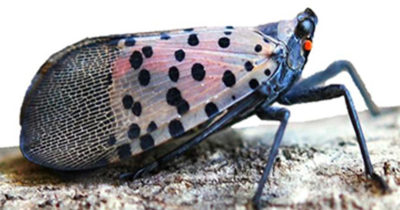May 8, 2018
Reading, May 8, 2018 − In conjunction with Penn State Extension, Sen. Judy Schwank has released six instructional videos relating to the identification and control of the spotted lanternfly.
In the videos, three Extension educators – Emelie Swackhamer, Amy Korman and Don Seifrit – show us how to identify Tree of Heaven, a known favorite of the insect, and how to use a few control measures. The videos, available at www.senatorschwank.com/spotted-lanternfly demonstrate:
- How to identify Spotted Lantern Fly egg masses
- How to identify Ailanthus altissima, the Tree-of-Heaven
- How to apply a systemic insecticide as a soil drench
- How to apply a systemic insecticide as a bark spray
- How to band trees for a Pennsylvania Department of Agriculture volunteer program
- How to make your own tree bands
Schwank, Democratic Chair of the Senate Agriculture & Rural Affairs Committee, said the videos will be useful as homeowners prepare for the hatching season.
“Now that spring is here, and summer is around the corner, spotted lanternfly eggs will soon be hatching,” Schwank said. “That’s why we put these videos together. We want to give homeowners another tool to stave off this pest.”
The invasive pest was first discovered in Berks County in September 2014. The Pennsylvania Department of Agriculture mandated quarantine to control its spread which includes several counties in Southeastern Pennsylvania. For more information, visit the agriculture department’s website: www.agriculture.pa.gov.
-30-
How to Identify and Destroy Spotted Lanternfly Egg Masses
How to Apply Systemic Pesticides as a Bark Spray
How to Make Your Own Tree Bands
How to Identify Ailanthus altissima, the Tree of Heaven
How to Band Trees for Voluntary Spotted Lanternfly Tree Banding Program
How to Apply Systemic Pesticides as a Soil Drench
February 7, 2018
Harrisburg, February 7, 2018– State Sen. Judy Schwank (D-Berks) is encouraged by U.S. Secretary of Agriculture Sonny Perdue’s announcement of $17.5 million in emergency funding to stop the spread of the spotted lanternfly in southeastern Pennsylvania.
 “USDA has recognized how important it is to support us in our fight against the spotted lanternfly,” Schwank said. “With USDA, the Pennsylvania Department of Agriculture, as well as local farmers, businesses and homeowners, we have a strong chance of controlling how far the spotted lanternfly spreads, and minimizing the physical and economic damage created by this insect.”
“USDA has recognized how important it is to support us in our fight against the spotted lanternfly,” Schwank said. “With USDA, the Pennsylvania Department of Agriculture, as well as local farmers, businesses and homeowners, we have a strong chance of controlling how far the spotted lanternfly spreads, and minimizing the physical and economic damage created by this insect.”
The emergency funding comes at a key time, Schwank said, because spotted lanternfly eggs have not yet hatched. The funds will allow for a two-pronged approach with USDA’s Animal and Plant Health Inspection Service managing the outer perimeter of the infestation and PDA focusing on a 3-mile perimeter surrounding the core infested area, according to a USDA press release.
Pennsylvania also remains committed to the cause. Earlier this week Gov. Tom Wolf proposed $1.6 million in his budget address to fight the spotted lanternfly.
-30-
December 14, 2016
Harrisburg, December 14, 2016 In conjunction with Penn State Extension, Sen. Judy Schwank has released an instructional video demonstrating how to kill spotted lanternfly eggs. The spotted lanternfly is an invasive pest that state officials worry could damage the state’s grape and wine industries. While most adult spotted lanternflies have frozen to death, their eggs can survive over winter and are viable from about October through July.
In the video, Extension educator Emelie Swackhamer uses a plastic card to remove two egg masses from a bench. The masses are scraped into a sealable plastic bag filled with rubbing alcohol to kill them. Double-bagging the eggs also works. The video is part of a larger segment on the spotted lanternfly for Sen. Schwank’s monthly television show. The segment will air on BCTV on Sundays in January.
Schwank, Democratic Chair of the Senate Agriculture & Rural Affairs Committee, cautions anyone scraping eggs to do so safely.
She also applauds efforts between local, state and federal agencies to eradicate the lanternfly.
“Without the partnerships between our townships and boroughs and the state department of agriculture, the spotted lanternfly would surely be a problem in multiple states,” she said. “If you have questions about scraping eggs, please contact your local extension agent.”
The invasive pest was first discovered in Berks County in September 2014. The Pennsylvania Department of Agriculture mandated quarantine to control its spread now includes several municipalities within Bucks, Chester, Lehigh, Northampton and Montgomery counties. For more information, visit the agriculture department’s website: www.agriculture.pa.gov.
-30-

 “USDA has recognized how important it is to support us in our fight against the spotted lanternfly,” Schwank said. “With USDA, the Pennsylvania Department of Agriculture, as well as local farmers, businesses and homeowners, we have a strong chance of controlling how far the spotted lanternfly spreads, and minimizing the physical and economic damage created by this insect.”
“USDA has recognized how important it is to support us in our fight against the spotted lanternfly,” Schwank said. “With USDA, the Pennsylvania Department of Agriculture, as well as local farmers, businesses and homeowners, we have a strong chance of controlling how far the spotted lanternfly spreads, and minimizing the physical and economic damage created by this insect.”